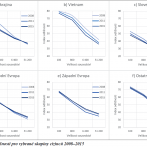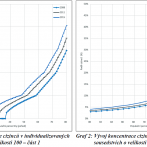Basic trends in the deployment of foreigners in the Czech Republic 2008-2015: Residential segregation from the perspective of individualized neighbourhoods of various size, by Martin Šimon, Ivana Křížková, Adam Klsák, Renáta Mikešová and Yana Leontiyeva
The number of foreigners living in the Czech Republic is on the rise and questions related to their coexistence refer to several domains such as the labour market, housing, social integration and the security policy of the government. Public administration, self-administration, specialists and the lay public are interested in whether the new inhabitants are benefi cial to Czech society and how they integrate into it. One possible indicator of dysfunction in the integration process is residential segregation, in other words a situation in which foreigners live in a signifi cantly different way and a different place from the dominant society. This article presents new data on the deployment of foreigners as collected by means of the population grid and using the method of nearest neighbourhoods to measure residential segregation. Independent from the administrative division of the territory, this method takes into account spatial proximity. The use of neighbourhoods of varied areas makes it possible to follow various development trends at the micro, meso and macro levels. As for the results, in overall terms residential segregation is decreasing: the rising number of foreigners results in greater regularity in their deployment rather than creating locations of high concentration. These results have important implications for planning in public administration. First, it pays off to continue to observe trends in migration and spatial deployment of foreigners, as it is important for public administration to infl uence the attitudes of the public to migrants. Second, the research has shown that it is necessary to collect specifi c information on the number and deployment of foreigners in the Czech Republic because of the specifi c services demanded by a foreign population (particularly in basic education and consultation for orientation in Czech society) that can help to incorporate migrants in the majority society and support the positive impact of migration for the Czech Republic.






Facebook
Twitter
Tweets by SociologickyNewsletter